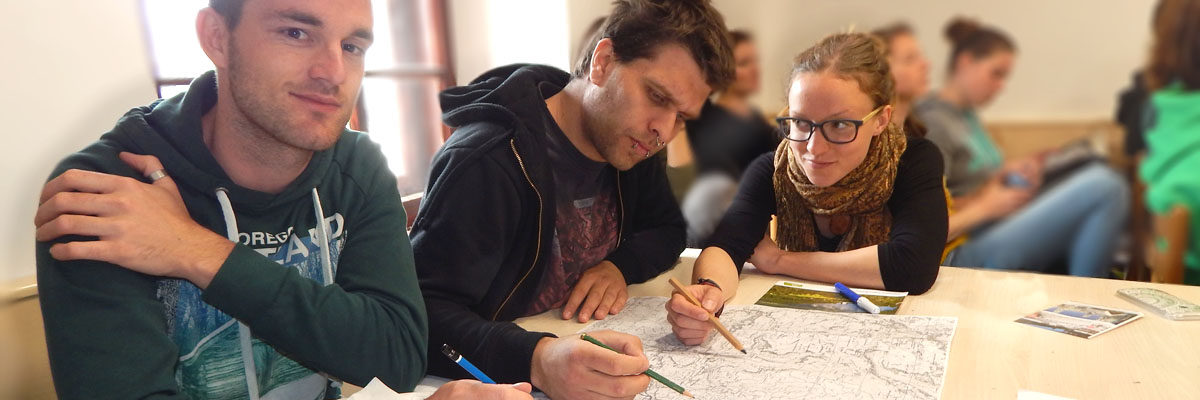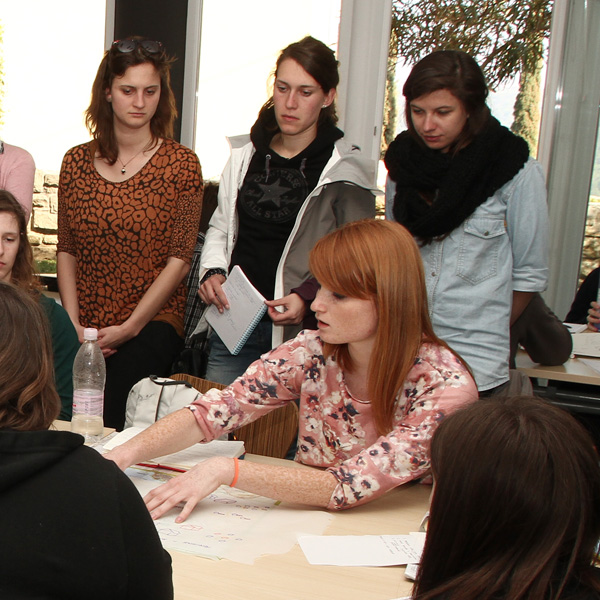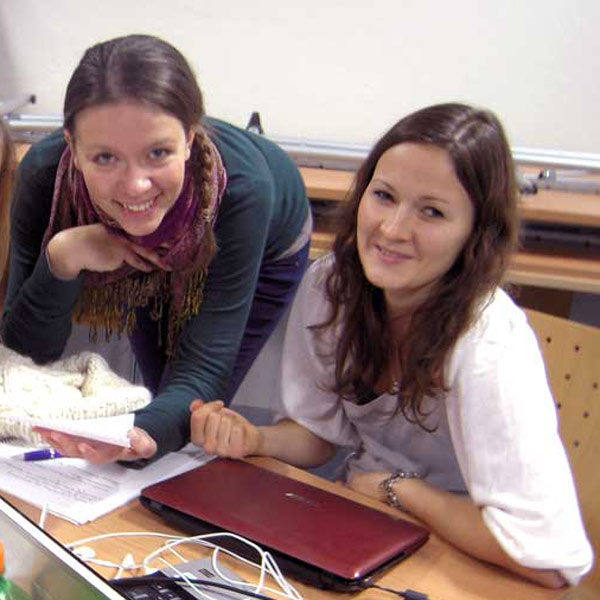
2nd Cycle: Spatial Planning (MSc)
The second cycle master study program Spatial Planning is organised within the UL FGG study programs at the Department of Geodesy. However, due to its interdisciplinary characteristics, it is also interesting for the first cycle graduates from other faculties, who wish to focus their studies into spatial planning.
The study qualifies top experts from the area of sustainable spatial planning, which includes planning of urban and rural spatial development at different levels, from international, national to local. Graduates of the Spatial Planning study program are qualified for the elaboration of spatial plans at different levels, for the work in various sectors related to spatial planning and spatial design, in the administration, development, research and teaching. The aim of the study program is to qualify experts for special spatial tasks, such as: spatial planning of tourism, industry, agriculture and forestry, location decisions, traffic planning, spatial planning of power supply, water supply, municipal, environmental and other systems, and to educate professionals for the work in mixed, interdisciplinary project groups.
Graduates of the second cycle master study program Spatial Planning receive adequate knowledge to work as spatial planner.
The second cycle master study program Spatial Planning consists of two years (four semesters) and amounts to 120 credit points. It has no orientations. After the studies, graduates are awarded the professional title MAGISTER PROSTORSKEGA PLANIRANJA (Master of Science in Spatial Planning) with shorter title: M.Sc. Spat. Plan..
places for master study programme Spatial Planning (MSc)
Study programme courses – Spatial Planning (MSc)
Basic goals of the programme
The study is organised in the framework of the studies offered at UL, FGG, the Department of Geodesy, but due to its interdisciplinary nature it is also interesting for students from other faculties with finished first degree who wish to focus on spatial planning. For students who already possess basic knowledge from spatial sciences there are no entry conditions, all other shall pass differential exams. In the majority of the developed European countries and the world spatial planners get the main skills at the second degree, when their special knowledge is upgraded with interdisciplinary knowledge of spatial planning.
The study program qualifies students for spatial planners – generalists with balanced knowledge and skills from the areas of spatial planning, environment protection, geoinformation, urban and regional geography, spatial legislation, spatial economy, spatial sociology, infrastructural systems and other spatial sciences.
General competences
- generally well-informed and possessing knowledge from academic areas and scientific methods of work,
- development of skills to define, research, understand and creatively solve problems, principles and theories,
- critical observation and understanding of the situation in space, planning as individuals or within teams, independent collection of knowledge and search for sources,
- development of abilities of critical, analytical and synthetic thinking,
- qualified for the transfer and use of theoretic knowledge in practice and solving of professional and practical problems,
- development of professional and ethical responsibility,
- development of scientific literacy, public appearance and communication with customers,
- presentation and explanation of knowledge and results,
- general communication competences acquired mainly through presentations and discussions in seminars and within field work as preparation for practical tasks,
- ability to use foreign professional language in written and oral communication, communication in national and international scientific circles,
- ability to use information-communication technology,
- skills for creating interdisciplinary connections,
- respect for safety, functional and economic planning, nature protection and ecological aspects at work,
- development of moral-ethical standards (integrity of working with clients, unbiased advice, independence and expertise according to valid legislation),
- building an objective view to environment and society,
- acceptance of professional responsibilities to participants in spatial planning and to society as a whole
Course-specific competences acquired with the programme
Course-specific competences acquired with the programme:
- understands the role and importance of spatial planning in modern society;
- understands the role and importance of implementing sustainable principles of interventions into space, environment protection and natural resources;
- is qualified for spatial planning at the local, regional, national and international levels;
- acquisition of licence for spatial planning and urbanism ZAPS (Chamber of Architecture and Spatial Planning),
- is qualified for the work at responsible positions in government administration regarding location decisions, inspections, for the coordination of sectors related to interventions into space;
- is qualified for the work with strategic development plans and implementation plans of municipalities, regions, state and with strategic plans of economic public services; inclusion into international spatial planning (in EU and outside);
- is qualified for the harmonisation of development and safety demands within interventions into space;
- is qualified for ensuring democratic principles within interventions into space and acceptability in social environment;
- is qualified for assuring market success and economic land development;
- is qualified for managing spatial databases, managing GISs for different tasks, spatial analyses and forecasts;
- is capable of synthesising spatial-environmental, economic, social, cultural and other components of integral planning;
- is capable of creating new knowledge in the profession with the emphasis on interdisciplinary character of phenomena in the space;
- is qualified for educational, research and development work in the areas of spatial planning and environment.
Conditions for enrolment
- 1st cycle studies from the areas of spatial studies and spatial development;
- 1st cycle higher education professional studies before the introduction of the Bologna reform from the area of spatial studies and spatial development;
- graduates of 1st cycle academic programmes of related studies, provided that before enrolment candidates finish study obligations essential for the continuation of study and containing contents from spatial planning, statistics and use of GIS tools; any missing contents shall be defined considering the differences of the professional field in the form of differential exams consisting of 10 to 60 ECTS. Candidate may pass such exams during the 1st cycle studies or before the enrolment to the master study of Spatial Planning;
- 1st cycle higher education professional study before the introduction of Bologna reform from related areas, provided that before enrolment candidates finish study obligations essential for the continuation of study and containing contents from spatial planning, statistics and use of GIS tools; any missing contents shall be defined considering the differences of the professional field in the form of differential exams consisting of 10 to 60 ECTS; Candidate may pass such exams during the 1st cycle studies or before the enrolment to the master study of Spatial Planning.
Obligations of the individual bridging programme shall be defined by the Study Board of the Department of Geodetic Engineering according to the missing knowledge of the candidate as obtained in previous education. The same is valid for the enrolment of students from other higher education institutions in Slovenia, EU and elsewhere.
In case of restricted enrolment the following conditions shall be considered: grade obtained in the first cycle study (100%). The number of places is determined in the Call for enrolment into second cycle study programmes of the University of Ljubljana individually for each academic year.
Criteria for recognising knowledge and skills acquired before enrolment in the programme
For the acknowledgement of knowledge and skills the following shall be considered:
- certificates and other documents evidencing finished courses and other forms of education,
- evaluation of plans, studies, research work, publications and other original works of the student,
- evaluation of knowledge acquired by the student based on self-education or learning from experiences (possibility of completing study obligations without participation at lectures, practical work, seminars),
- adequate work experiences.
Shall the Study Board of the department establish that the acquired knowledge may be acknowledged, this shall be evaluated with the same number of points according to ECTS as the number of points in the subject.

Conditions for progression through the programme
Conditions for the progression from one year to another
The student may enrol to subsequent year, if they complete by the end of the study year all the obligations foreseen by the study plan, amounting to at least 45 ECTS.
Exceptionally the student may enrol to subsequent year if he/she has not completed all his/her obligations defined by the study programme as the condition to enrol to higher year, if they have justifiable reasons as defined by the UL Statute The UL FGG Commission for solving student applications decides on exceptional enrolment.
Under the conditions from the above paragraph the student may enrol to subsequent year with at least 30 ECTS points collected. The Study Board of the Department of Civil Engineering of UL FGG adopts the decisions about the enrolment from the above paragraph.
A student who shows above-average academic results in his/her studies is given the opportunity to advance faster. The decision on this is made by the Dean of UL FGG on the basis of the candidate’s application and the reasoned opinion of the Study Board of the UL FGG Department of Geodetic Engineering. The decision determines the method of faster advancement.
Conditions for repeated enrolment in the same year
Failing to meet all the obligations defined by the study programme for the advancement in the next year, students may enrol in the same year for the second time. They are entitled to the repeated enrolment only once for the duration of the study, provided that they achieve at least 30 credit points according to ECTS.
Conditions for extension and suspension of the status of student
Conditions for the extension of the status of student are defined by Article 158, and the conditions for suspension of the status of student by Article 240 of the Statute of the University of Ljubljana.
Requirements for completion of the study
In compliance with the Professional and Academic Titles Act (Official Gazette No. 61/2006) professional and scientific titles as well as titles acquired by education shall not be translated to foreign languages. However, as reference only, the title acquired according corresponds to the English title Master of spatial planning.
Transfers between study programmes
Transfers are possible from the second cycle study programmes, and until their expiration also from the undergraduate academic study programmes adopted after June 11 2004, where the competences of the finished studies are comparable and according to the acknowledgement criteria at least half of the obligations according to ECTS from the first study programme related to compulsory courses of the second study programme can be acknowledged. Considering the scope of acknowledged obligations from the first study programme in the Republic of Slovenia or abroad student may enrol to the same or higher year in the second study programme. Transferring students shall fulfil the conditions for the enrolment to the second study programme.
Applications of candidates for the transfer to the second cycle master study programme Spatial planning and the scope of acknowledged obligations in the study programme will be examined individually by the Study Board of the Department of Geodesy. If in the procedure of acknowledging obligations for the purpose of transfer the candidate is approved at least the amount of credit points and those point that are required for the enrolment to a higher year of the second cycle master study programme Spatial planning, the candidate may enrol to the higher year of the second cycle master study programme Spatial planning.
Methods of Assessment
Knowledge is examined and evaluated in individual courses. Accordingly, the teaching process in each course finishes with the examination of knowledge and acquired skills. The forms of knowledge testing (oral or written examinations, preliminary examinations, seminar works, work logs, practical assignments, projects, portfolios, peer evaluation) are defined in the study plans of individual courses. General rules of knowledge testing are regulated by the Rules on the first and second cycle studies at the UL FGG, adopted by the Senate of FGG. The details are defined by the Study Regulations.
The student receives a single grade of the exam, consisting of foreseen required obligations in each course. Each obligation shall be evaluated with a positive grade.
Knowledge from preliminary and partial examinations, seminars, seminar works, work logs, practical projects, home projects, homework and similar amounts to at least 30 % of the total grade.
According to the Statute of the University of Ljubljana the following grading scale is used:
10 – (91–100 %: excellent: exceptional results with negligible mistakes),
9 – (81–90 %: very good: above average knowledge with few mistakes),
8 – (71–80 %: very good: sound outcomes),
7 – (61–70 %: good: good knowledge, but with significant shortcomings)
6 – (51–60 %: sufficient: performance meets the minimum criteria),
5 – (50 % and less: unsatisfactory: performance does not meet minimum criteria).
The candidate's performance is considered successful for grades from satisfactory (6) to excellent (10).
Possibilities of elective courses and mobility
Student may transfer 30 ECTS points of the programme (one study semester, regardless of compulsory and elective units) from any other area of civil engineering, provided that there exists an adequate agreement signed with UL FGG.


All study programmes on Faculty of Civil and Geodetic Engineering are internationally certified from 2015 to 2021.
